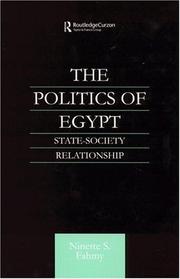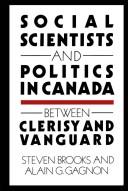| Listing 1 - 6 of 6 |
Sort by
|

ISBN: 1134833601 0203297237 9780203297230 0203427750 9780203427750 9786610320462 6610320462 0415111307 9780415111300 0415111315 9780415111317 9781134833603 9781134833559 1134833555 9781134833597 1134833598 128032046X Year: 1996 Publisher: London Routledge
Abstract | Keywords | Export | Availability | Bookmark
 Loading...
Loading...Choose an application
- Reference Manager
- EndNote
- RefWorks (Direct export to RefWorks)
The central argument of Japan and the Enemies of Open Political Science is that Eurocentric blindness is not a moral but a scientific failing. In this wide-ranging critique of Western social science, Anglo-American philosophy and French theory, Williams works on the premise that Japan is the most important political system of our time. He explains why social scientists have been so keen to ignore or denigrate Japan's achievements. If social science is to meet the needs of the Pacific Century', it requires a sustained act of intellectual demolition and subsequent renewal.
Social sciences --- Political science --- Social Sciences --- Social Sciences - General --- Philosophy --- Research --- Politics --- Japan --- Social Sciences And State --- Political Science --- Social Science --- Social sciences and state --- Social science --- Philosophy. --- Research.

ISBN: 0700716106 9781136129865 1136129863 9780203037485 0203037480 9781136129940 1136129944 9781136130021 1136130020 9780415612746 0415612748 9780700716104 1283712350 9781283712354 Year: 2002 Publisher: Oxon [England] : Routledge,
Abstract | Keywords | Export | Availability | Bookmark
 Loading...
Loading...Choose an application
- Reference Manager
- EndNote
- RefWorks (Direct export to RefWorks)
This book addresses two important matters of current concern to Middle East scholars: firstly, the nature of the Egyptian state and society and the interactive process between them and secondly, how change, which would finally lead to development, can be initiated. The book argues that the Egyptian case represents a weak authoritarian state, which through its coercive and repressive policies towards various societal forces, political parties, professional associations and organisations and individuals, creates a weak society. Individual behaviour in urban and rural communities, sometimes viewe
Egypt --- Egypte --- Politics and government --- Politique et gouvernement --- Politics and government. --- Political science --- Social sciences and state --- Administration --- Civil government --- Commonwealth, The --- Government --- Political theory --- Political thought --- Politics --- Science, Political --- Social sciences --- State, The --- State and social sciences --- Cultural policy

ISBN: 1282851160 9786612851162 0773561773 9780773561779 0773506632 9780773506633 9781282851160 6612851163 Year: 1988 Publisher: Kingston [Ont.] McGill-Queen's University Press
Abstract | Keywords | Export | Availability | Bookmark
 Loading...
Loading...Choose an application
- Reference Manager
- EndNote
- RefWorks (Direct export to RefWorks)
Social scientists have played many roles in Canadian politics since the Second World War. Stephen Brooks and Alain Gagnon examine the forms and extent of social scientists' involvement in the political process, their relationship to the state, and the complexities of their class position. The unique development of the social sciences in Quebec and their relationship to Quebec nationalism are examined and distinctions between development in this community and in the predominantly anglophone community of the rest of Canada are contrasted.
Social scientists --- Social sciences and state --- State and social sciences --- Cultural policy --- Scientists --- Policy scientists --- Social conditions. --- History --- Québec (Province) --- Politics and government --- Quebec (Province) --- Canada --- Politics and government.
Book
ISBN: 9782802801818 2802801813 2802804987 Year: 2008 Volume: 54 Publisher: Bruxelles Facultés universitaires Saint Louis
Abstract | Keywords | Export | Availability | Bookmark
 Loading...
Loading...Choose an application
- Reference Manager
- EndNote
- RefWorks (Direct export to RefWorks)
Le concept de risque est un terme ancien, qui viendrait, via l'italien risico ou l'espagnol riesgo, du latin resecumqui signifie ce qui coupe. Comme menace, le risque est étroitement associé au régime de l'assurance depuis le XVIe siècle. Depuis, il n'a cessé de se developper comme mode de gouvernementalité des hommes et des populations. Ces dernières années, société du risque et principe de précaution ont fait leur apparition, pour dési-gner une nouvelle génération de dangers non prévisibles et non assurables, mais sans doute aussi pour souligner un changement assez significatif de notre rapport à la science, aux normes et à la responsabilité dans le cadre de société dites «réflexives». Mais depuis Pascal et son célèbre pari, le risque est aussi valeur positive, synonyme de choix en contexte d'incertitude. Dans cette dimension, le risque en tant que prise de risquerenvoie à la part de liberté et de responsabilité que tout homme est condamné à assumer. Alea iacta est... Qu'est-ce que le risque? Que signifie société du risque? Quels changements dans les modes de gouvernementalité le concept de risque introduit-il dans les politiques publiques (sociales, pénales, familiales, de la santé)? Quels enjeux philosophiques le risque pose-t-il dans des sociétés victimaires qui font volontiers l'apologie de l'homme précautionneux et l'éloge du risque zéro? C'est autour de ces questions qu'est construit cet ouvrage, fruit d'un séminaire de deux ans mené par le Réseau Interdisciplinarité et Société (RIS) aux Facultés universitaires Saint-Louis
Organization theory --- Affective and dynamic functions --- Social psychology --- Risk --- Risk management --- Risque --- Gestion du risque --- Political aspects --- Sociological aspects --- Aspect politique --- Aspect sociologique --- Prise de risque --- Sociologie du risque --- Politique publique --- Sociologie --- Philosophy --- Prise de risque. --- Politique publique. --- Sociologie. --- Monograph --- Sociology --- risque --- politique publique --- prise de risque --- choix --- société du risque --- philosophie --- société victimaire --- ambivalence --- Social sciences and state
Book
ISBN: 0801469600 9780801469602 9780801449673 0801449677 Year: 2013 Publisher: Ithaca, NY
Abstract | Keywords | Export | Availability | Bookmark
 Loading...
Loading...Choose an application
- Reference Manager
- EndNote
- RefWorks (Direct export to RefWorks)
During the height of the wars in Iraq and Afghanistan, the Pentagon launched a controversial counterinsurgency program called the Human Terrain System. The program embedded social scientists within military units to provide commanders with information about the cultures and grievances of local populations. Yet the controversy it inspired was not new. Decades earlier, similar national security concerns brought the Department of Defense and American social scientists together in the search for intellectual weapons that could combat the spread of communism during the Cold War. In Armed with Expertise, Joy Rohde traces the optimistic rise, anguished fall, and surprising rebirth of Cold War-era military-sponsored social research. Seeking expert knowledge that would enable the United States to contain communism, the Pentagon turned to social scientists. Beginning in the 1950's, political scientists, social psychologists, and anthropologists optimistically applied their expertise to military problems, convinced that their work would enhance democracy around the world. As Rohde shows, by the late 1960's, a growing number of scholars and activists condemned Pentagon-funded social scientists as handmaidens of a technocratic warfare state and sought to eliminate military-sponsored research from American intellectual life. But the Pentagon's social research projects had remarkable institutional momentum and intellectual flexibility. Instead of severing their ties to the military, the Pentagon's experts relocated to a burgeoning network of private consulting agencies and for-profit research offices. Now shielded from public scrutiny, they continued to influence national security affairs. They also diversified their portfolios to include the study of domestic problems, including urban violence and racial conflict. In examining the controversies over Cold War social science, Rohde reveals the persistent militarization of American political and intellectual life, a phenomenon that continues to raise grave questions about the relationship between expert knowledge and American democracy.
Social sciences --- Sociology, Military --- Social sciences and state --- Cold War --- State and social sciences --- Cultural policy --- Military sociology --- Armed Forces --- Armies --- Peace --- War --- War and society --- Behavioral sciences --- Human sciences --- Sciences, Social --- Social science --- Social studies --- Civilization --- Research --- History --- Social aspects
Book
ISBN: 9781107047907 9781107256538 9781107672888 9781139871099 1139871099 1107256534 1107047900 113969927X 1139862324 1139861093 1139865374 1139863231 1139868942 1107672880 Year: 2014 Publisher: Cambridge Cambridge University Press
Abstract | Keywords | Export | Availability | Bookmark
 Loading...
Loading...Choose an application
- Reference Manager
- EndNote
- RefWorks (Direct export to RefWorks)
Cause is a problematic concept in social science, as in all fields of knowledge. We organise information in terms of cause and effect to impose order on the world, but this can impede a more sophisticated understanding. In his latest book, Richard Ned Lebow reviews understandings of cause in physics and philosophy and concludes that no formulation is logically defensible and universal in its coverage. This is because cause is not a feature of the world but a cognitive shorthand we use to make sense of it. In practice, causal inference is always rhetorical and must accordingly be judged on grounds of practicality. Lebow offers a new approach - 'inefficient causation' - that is constructivist in its emphasis on the reasons people have for acting as they do, but turns to other approaches to understand the aggregation of their behaviour. This novel approach builds on general understandings and idiosyncratic features of context.
Philosophy of science --- International relations. Foreign policy --- International relations. --- Social sciences and state. --- State and social sciences --- Cultural policy --- Coexistence --- Foreign affairs --- Foreign policy --- Foreign relations --- Global governance --- Interdependence of nations --- International affairs --- Peaceful coexistence --- World order --- National security --- Sovereignty --- World politics
| Listing 1 - 6 of 6 |
Sort by
|

 Search
Search Feedback
Feedback About UniCat
About UniCat  Help
Help News
News